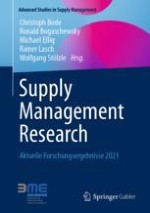2021 | Book
Supply Management Research
Aktuelle Forschungsergebnisse 2021
Editors: Prof. Dr. Christoph Bode, Prof. Dr. Ronald Bogaschewsky, Prof. Dr. Michael Eßig, Prof. Dr. Rainer Lasch, Prof. Dr. Wolfgang Stölzle
Publisher: Springer Fachmedien Wiesbaden
Book Series : Advanced Studies in Supply Management
